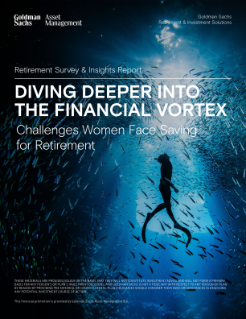Challenges Women Face Saving for Retirement
The Retirement Survey & Insights Report 2023 explored the ongoing impact of the Financial Vortex on working and retired populations. Our findings are from 5,261 individuals surveyed in July 2023 and provide insights from a diverse set of perspectives, including (i) "working individuals" (3,673 working individuals, and (ii) "retired individuals" (1,588 retired individuals) and (iii) gender and generational breakdowns. The survey was completed by 2,402 men and 2,836 women.
In this supplemental report, Challenges Women Face Saving for Retirement, we delve further into the retirement trends for men and women. We explore the impacts of the following headwinds to better understand how they can impact the ability to successfully prepare for retirement, particularly placing emphasis on women saving for retirement:
- Income Differences, potentially compounding over a lifetime, can result in significantly lower retirement savings for women.
- Family Care can cause career breaks and result in lost income and benefits, while potentially impacting long-term earning potential, career progression and retirement savings.
- Part-Time Work can be a result of caregiving often resulting in lower wages, fewer benefits, and less access to employer-sponsored retirement plans.
- Expectancy of a Longer Life for women means that on average they need to stretch their retirement savings over a longer period. This increased longevity requires more substantial savings to cover healthcare costs and living expenses in retirement.
- Social Security’s design often does not account for part-time work and career breaks, which can lead to lower benefits and pension income.
Despite these factors, we believe there is room for optimism. Our 2023 data shows a marked improvement in the retirement outlook of working women respondents, including (i) lower reported stress managing savings, (ii) higher reported confidence in their ability to meet their retirement goals and (iii) an increase in reported savings relative to the prior year.
To address the unique challenges that women can face, a multifaceted approach may be able to help. Addressing retirement benefits for part-time workers, financial education, and personalized solutions, for example, can all be important steps.
Caregiving continues to be key challenge as 40% of working women reported leaving their job for caregiving needs (childcare and eldercare), and 21% reported leaving a full-time job for part-time work to provide caregiving. Given the increasing needs and cost of care, caregivers report significantly higher impact from competing financial priorities. That said, male respondents report increasingly leaving the workforce and/or switching to part-time work to contribute to caregiving responsibilities.
The improving macro environment had a positive influence on our female respondents as they reported less of an impact on their ability to save for retirement year over year. Interestingly, the opposite was true for male respondents.
Nearly all respondents (95%) believe financial help is important, but there are differences in the type of help they seek. Women respondents prefer “do it for me” advice resources. For example, surveyed women are more likely to pay a financial advisor to manage their savings, rather than manage it themselves and/or seek periodic advice, compared to surveyed men. The reality is that most savers do not work with a financial advisor and while cost may be a factor, women are twice as likely as men to report that they do not have sufficient savings to work with a financial advisor.
Not only do our women respondents tend to retire earlier than planned, but they are more likely to do so for reasons other than they planned (i.e., health reasons, taking care of family member, or loss of job). Early retirement has important implications, including lower confidence in generating income, which can impact how people spend and live in retirement.
When considering “do it for me” resources, women respondents generally prefer guaranteed income solutions. Given the longer life expectancies that women face, guaranteed income solutions may alleviate some risks that are more difficult to manage.

